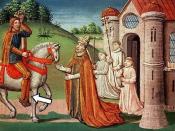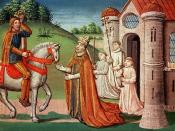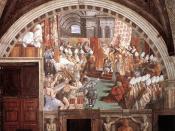The Relationship of Political and Religious Societies in the Age of Charlemagne, Based of Einhard's The life of Charlemagne sections 15-33 Matt Diggs III "He was especially concerned that everything in the church be carried out with the greatest possible dignity." Einhard, in his The Life of Charlemagne, makes clear the fundamental integration of politics and religion during the reign of his king. Throughout his life, Charles the Great endeavored to acquire and use religious power to his desired ends. But, if Charlemagne was the premiere monarch of the western world, why was religious sanction and influence necessary to achieve his goals? In an age when military power was the primary means of expanding one's empire, why did the most powerful military force in Europe go to such great lengths to ensure a benevolent relationship with the church? One possibility may be found in the tremendous social and political influence of Rome and her papacy upon the whole of the continent.
Rather than a force to be opposed, Charlemagne viewed the church as a potential source of political power to be gained through negotiation and alliance. The relationship was one of great symbiosis, and both componants not only survived but prospered to eventually dominate western Europe. For the King of the Franks, the church provided the means to accomplish the expansion and reformation of his empire. For the Holy Roman Church, Charles provided protection from invaders and new possibilities for missionary work.
The blessing of the church helped to unify and strengthen the resolve of the Frankish people as they withstood or conquered the heathen Viking and eastern Germanic tribes. The fact that Charles was Christian and was backed by the Catholic church must have certainly helped keep other christian powers from allying with these barbarians. For Rome, there were...


